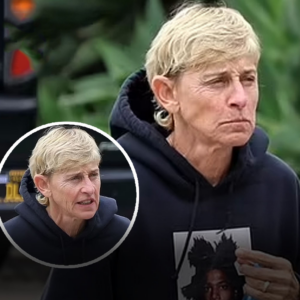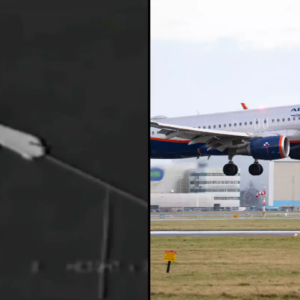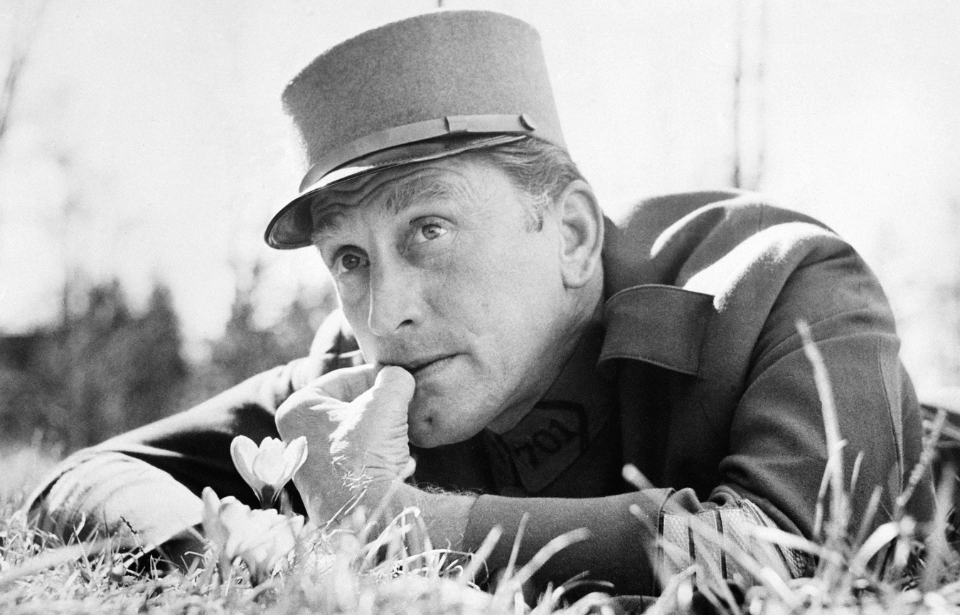
Kirk Douglas was a Hollywood legend, with many of his movies about war and military-related topics. He began his career in 1946 after serving with the US Navy during the Second World War. During the conflict, Douglas served as a communications officer in anti-submarine warfare aboard the USS PC-1139 and was discharged in 1944 after suffering injuries in a depth charge explosion.
After serving his country, Douglas brought his military experience to the big screen. The following are the war movies that helped make Kirk Douglas one of the genre’s best.
The Juggler (1953)
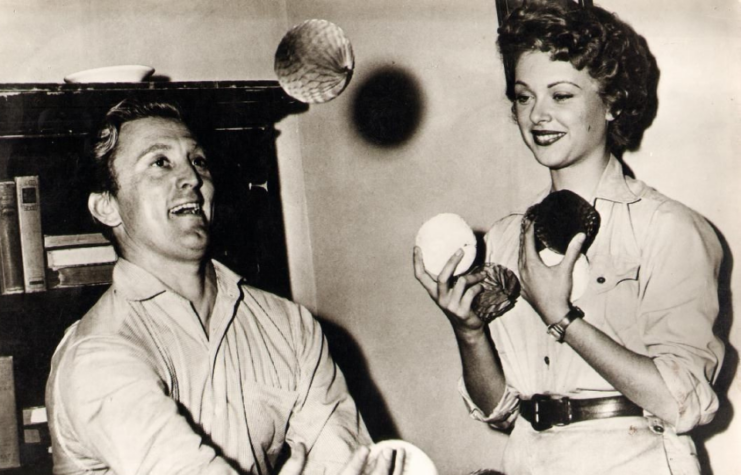
The Juggler, 1953. (Photo Credit: videorecord / MovieStillsDB)
The Juggler (1953) follows Hans Müller (Kirk Douglas), a Holocaust survivor haunted by the traumatic memories of his wartime experiences. He arrives in Israel as a displaced person and tries to rebuild his life while struggling with psychological scars. He discovers his talent for juggling, which becomes both a livelihood and a way to cope with his inner turmoil.
The movie explores the challenges faced by survivors of the Holocaust as they tried to integrate into a new society and grapple with their past experiences. Douglas delivers a poignant performance as a man struggling to find a sense of normalcy amid the lingering horrors of the Second World War.
Paths of Glory (1957)
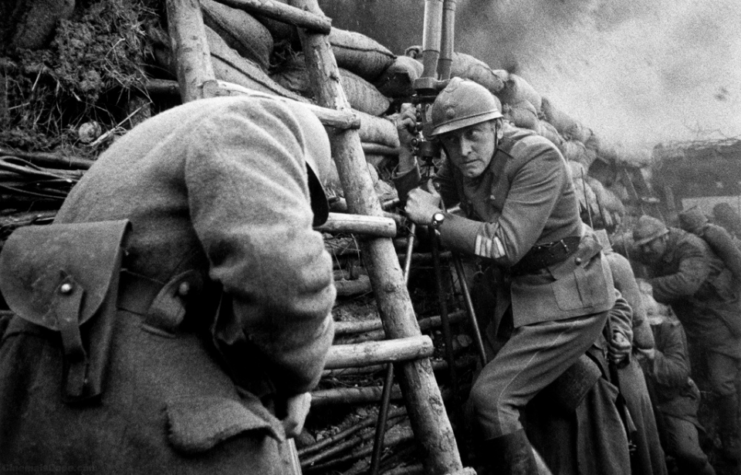
Paths of Glory, 1957. (Photo Credit: Beldek / United Artists / MovieStillsDB)
Paths of Glory (1957) is an anti-war movie directed by Stanley Kubrick and starring Kirk Douglas in the lead role of Col. Dax. The film, set during the First World War, is based on the novel of the same name by Humphrey Cobb, which itself was inspired by the Souain Corporals Affair.
When the attack fails and results in significant casualties, Brig. Gen. Paul Mireau (George Macready) decides to court-martial 100 soldiers. This is lowered to three – one from each company – who will be executed. Dax, appalled by the injustice and the callous disregard for his men’s lives, defends the accused in a court-martial trial.
Douglas delivers a powerful performance as Dax, portraying a leader torn between loyalty to his superiors and a deep sense of justice and compassion for his troops. The character’s journey becomes a point of moral conflict in the film, highlighting the inherent dehumanization and absurdity of war and military bureaucracy.
The Devil’s Disciple (1959)
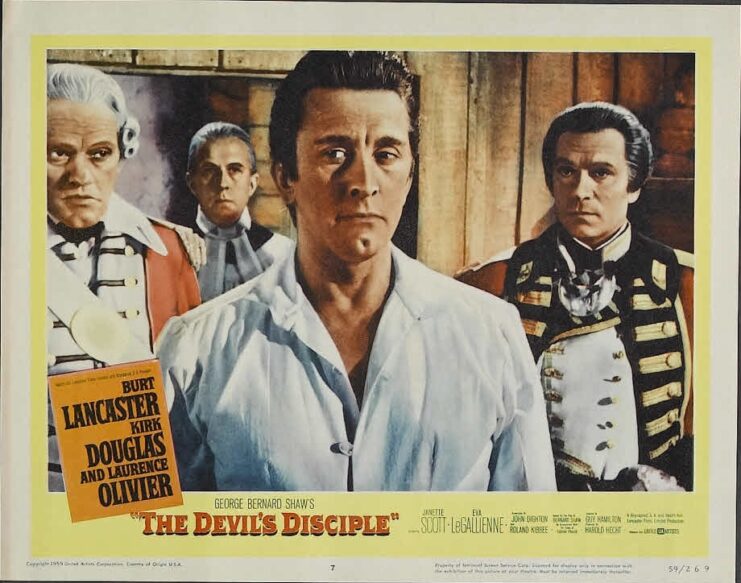
The Devil’s Disciple, 1959. (Photo Credit: MovieStillsDB)
The Devil’s Disciple (1959) is the film adaption of the George Bernard Shaw play of the same name. Directed by Guy Hamilton of James Bond fame, the movie stars Kirk Douglas, Burt Lancaster and Laurence Olivier.
Set during the American Revolution, the plot revolves around the small New Hampshire town of Websterbridge. Due to his unconventional beliefs and lifestyle, the principled yet somewhat irreverent Richard Dudgeon (Douglas) is considered the black sheep in this setting. Despite his rebellious nature, Dudgeon becomes unexpectedly entangled in the events of the war.
Douglas’ portrayal of Dudgeon brings a mix of wit, defiance and underlying moral integrity to the character. His performance stands out as he navigates the complex web of relationships and ethical dilemmas presented by the unfolding events.
Operation Petticoat (1959)
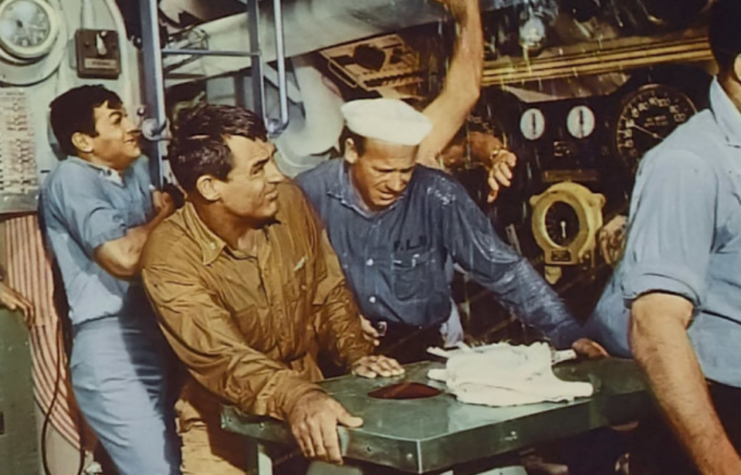
Operation Petticoat, 1959. (Photo Credit: cheerio15 / MovieStillsDB)
Operation Petticoat (1959) is a comedy directed by Blake Edwards and starring Cary Grant and Tony Curtis. The film is set during the Second World War, and combines elements of drama and humor.
The movie takes place aboard the fictional US Navy submarine USS Sea Tiger, which is in need of repair after suffering damage. Grant plays Lt. Cmdr. Matt T. Sherman, the vessel’s captain, who is determined to get her back into operational condition. Curtis portrays Lt. Nick Holden, a mischievous supply officer with a knack for improvisation.
Kirk Douglas only appears in this war-era movie as a welding seaman and is ultimately uncredited for his part.
Spartacus (1960)
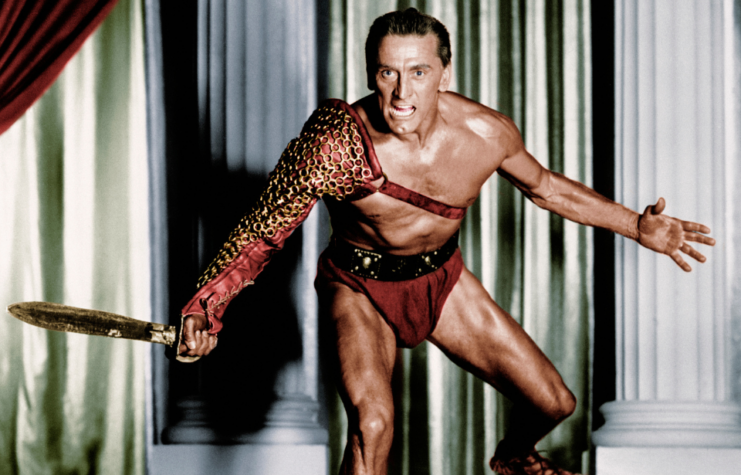
Spartacus, 1960. (Photo Credit: Bettmann / Getty Images)
Spartacus (1960) is a historical epic directed by Stanley Kubrick and starring Kirk Douglas. The film is based on the events of the Third Servile War, a slave revolt against the Roman Republic led by the gladiator Spartacus. The movie’s production was notable for its scope and scale, featuring large-scale sets, impressive costumes and a memorable cast that included Laurence Olivier, Jean Simmons, and Peter Ustinov.
Douglas plays the role of Spartacus, a former gladiator and slave who becomes a symbol of resistance against the oppressive Roman regime. The story follows him from his early days as a slave in a gladiatorial school to his rise as a charismatic leader who rallies his fellow slaves in a quest for freedom.
Along the way, Spartacus forms alliances, captures the hearts of his followers and becomes a symbol of hope. As the revolt gains momentum, his ideals of freedom, equality and justice attract a diverse group of followers, including escaped slaves and Roman sympathizers.
Spartacus portrays the gladiator as a courageous and determined leader driven by a desire to liberate his people from the chains of slavery.
Town Without Pity (1961)
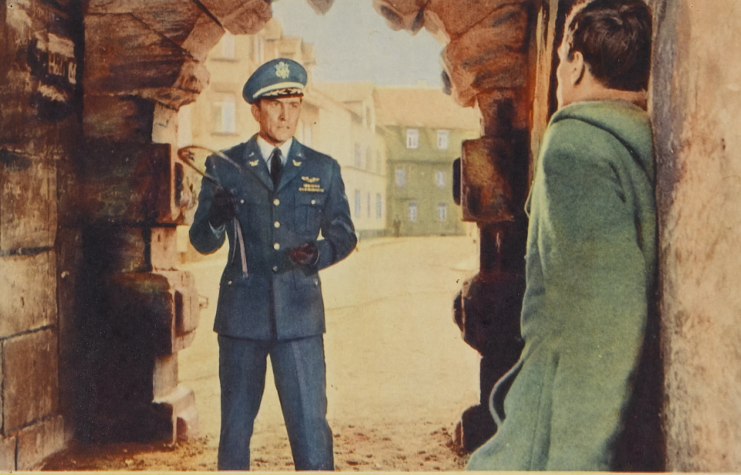
Town Without Pity, 1961. (Photo Credit: MovieStillsDB)
Town Without Pity (1961) covers themes of justice, prejudice and morality in a small German town following a controversial trial involving American soldiers. Kirk Douglas portrays Maj. Steve Garrett, a defense attorney charged with defending the four US soldiers accused of assaulting a local German girl.
The alleged incident sparks public outrage and anti-American sentiment in the German town. As Garrett investigates the case, he discovers a complex web of emotions, secrets and cultural clashes that complicate the truth behind the accusations.
Town Without Pity explores the challenges faced by Garrett as he strives to ensure a fair trial for the accused in the face of the townspeople’s hostility and biases. While confronting personal and professional obstacles, he becomes entangled in the town’s dynamics and faces his own moral dilemmas as he seeks justice.
The Hook (1963)
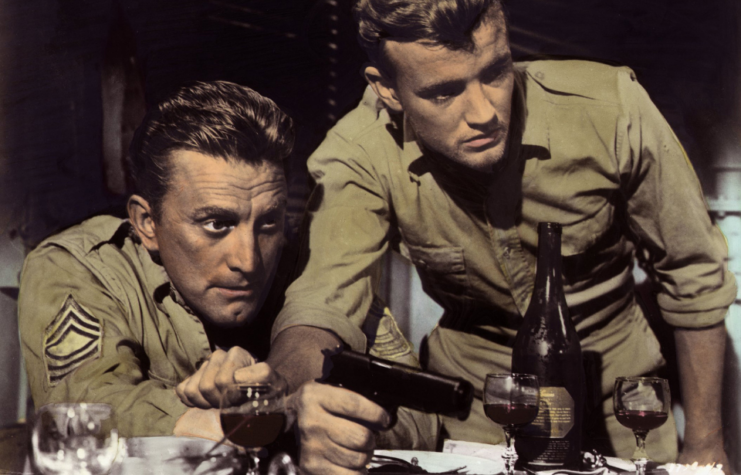
The Hook, 1963. (Photo Credit: Film Publicity Archive / United Archives / Getty Images)
The Hook (1963) provides a gripping portrayal of the challenges a group of American servicemen faced during the Korean War. The movie is based on the 1957 novel L’hameçon by Vahé Katcha, with its title being a translation of the novel’s title, instead of a reference to the Battle of the Hook, which encompassed three separate engagements during the conflict.
Kirk Douglas plays Sgt. P. J. Briscoe, leader of one of the Eighth US Army’s squads, who’s ordered to execute a Korean People’s Army Air Force pilot. The movie follows the story of the morality behind the order and what Briscoe chooses to do.
Seven Days in May (1964)
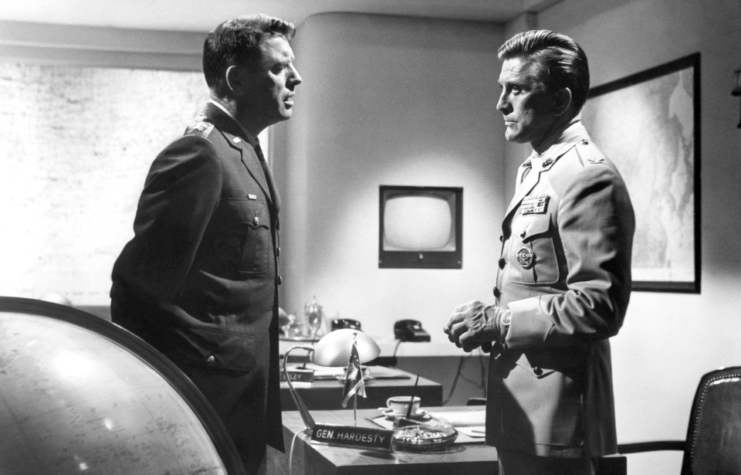
Seven Days in May, 1964. (Photo Credit: SpikeBlazer / MovieStillsDB)
Seven Days in May (1964) is a political thriller directed by John Frankenheimer. The film is based on the novel of the same name by Fletcher Knebel and Charles W. Bailey II, and explores themes of power, loyalty and the potential dangers of military influence in politics.
As Casey becomes increasingly suspicious of his superior, Gen. James Mattoon Scott (Burt Lancaster), he discovers evidence of a potential conspiracy. He subsequently becomes embroiled in a race against time to uncover the truth and prevent a potentially catastrophic political crisis.
In Harm’s Way (1965)
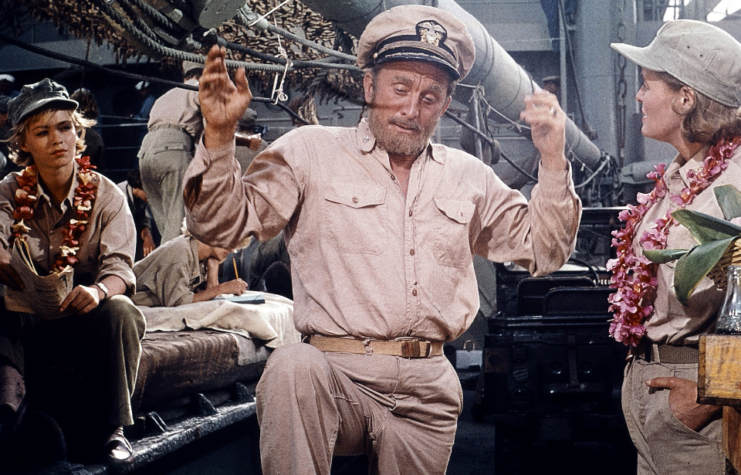
In Harm’s Way, 1965. (Photo Credit: Paramount / Getty Images)
In Harm’s Way (1965) is a World War II-era film set in the Pacific Theater. It centers around the personal and professional struggles of naval officers and soldiers in the face of the challenges of war.
Kirk Douglas stars as Capt. Paul Eddington. The film follows Eddington and Rear Adm. Rockwell W. “Rock” Torrey (John Wayne), who face external and internal conflicts as they bring the fight to the Japanese following the attack on Pearl Harbor.
The Heroes of Telemark (1965)
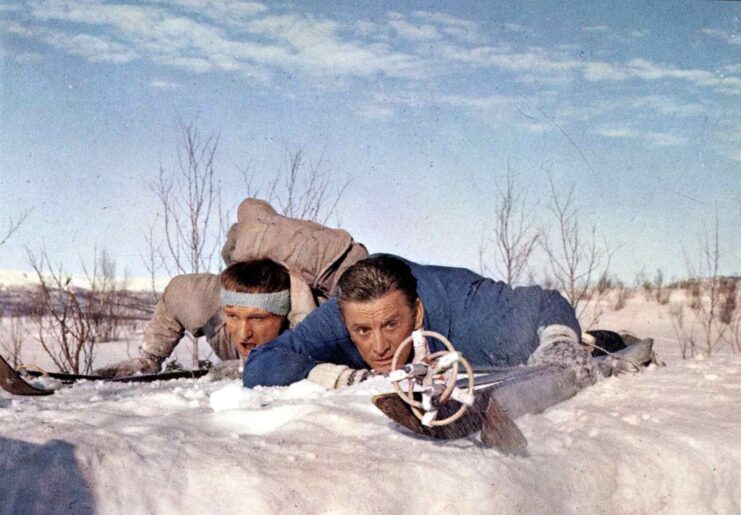
The Heroes of Telemark, 1965. (Photo Credit: FilmPublicityArchive / United Archives / Getty Images)
The WWII-era film The Heroes of Telemark (1965) is based on the actual events of the Norwegian Resistance’s effort to thwart German attempts to develop nuclear weapons during the conflict. Kirk Douglas portrays Dr. Rolf Pedersen, a Norwegian physics professor and Resistance fighter who becomes involved in a daring mission to sabotage the German-controlled heavy water plant in Telemark, Norway.
As part of the Resistance, Pedersen teams up with other dedicated fighters, including Knut Straud (Richard Harris). Together, they plan and execute dangerous and audacious actions to disrupt the Germans’ efforts. The film showcases their bravery, resourcefulness and determination in the face of overwhelming odds.
Cast a Giant Shadow (1966)
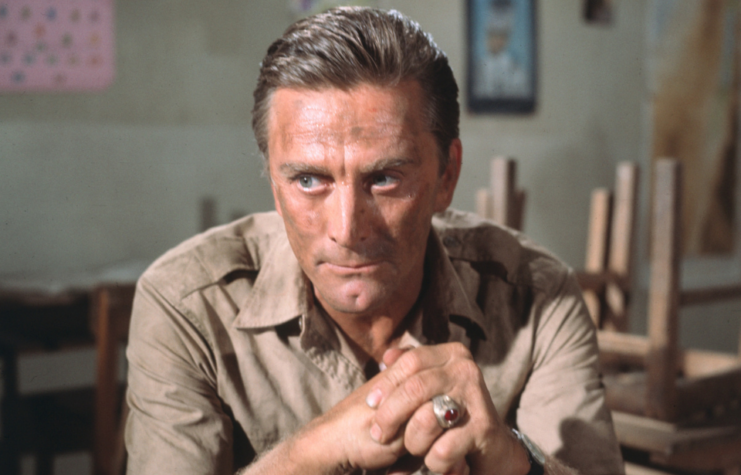
Cast a Giant Shadow, 1966. (Photo Credit: nadaone / Metro-Goldwyn-Mayer / United Artists / MovieStillsDB)
Cast a Giant Shadow (1966) is based on the true story of Col. David “Mickey” Marcus, a US military officer who, after serving as a key figure in America’s civil affairs policies during WWII went on to play an even more significant role in the early days of Israel’s fight for independence.
The film follows Marcus, portrayed by Kirk Douglas, as the Israeli government recruits him to establish and organize the fledgling Israeli Defense Forces (IDF) during the critical period of the 1948 Arab-Israeli Conflict. While in Israel, he was killed in a friendly fire incident.
Is Paris Burning? (1966)
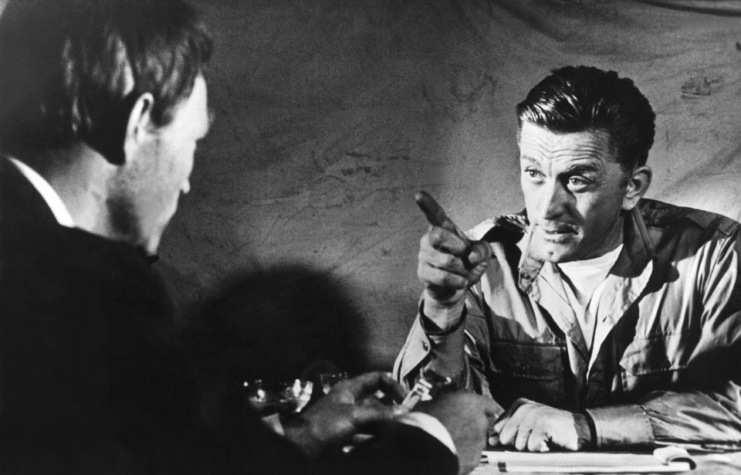
Is Paris Burning?, 1966. (Photo Credit: Sunset Boulevard / CORBIS / Getty Images)
Is Paris Burning? is a war movie based on the historical events surrounding the liberation of Paris from its German occupiers toward the end of the Second World War. Kirk Douglas portrays the iconic Gen. George S. Patton.
The film captures the tension, risks and sacrifices made by those involved in the Resistance efforts. Douglas’ portrayal of Patton adds a touch of realism, drawing from the historical figure’s larger-than-life persona.
Victory at Entebbe (1976)
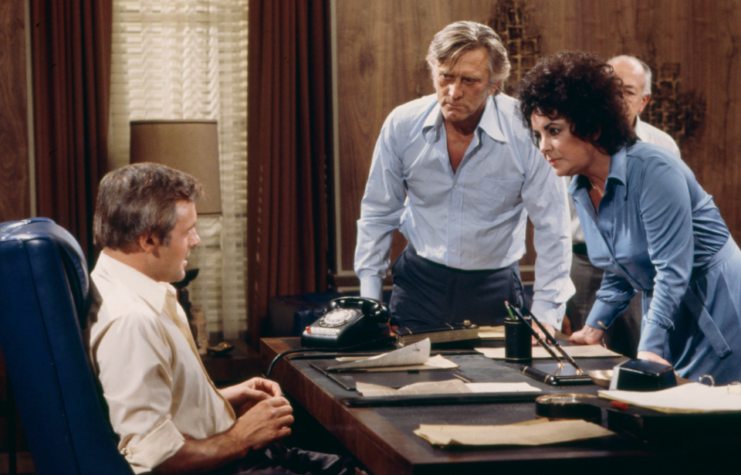
Victory at Entebbe, 1976. (Photo Credit: American Broadcasting Companies / Getty Images)
Victory at Entebbe (1976) is based on the real-life Entebbe Raid, a daring hostage rescue mission carried out by the Israel Defense Forces (IDF). Kirk Douglas portrays Hershel Vilnofsky and is joined by an ensemble cast that includes Richard Dreyfuss, Anthony Hopkins, Burt Lancaster and Elizabeth Taylor.
The film centers around the hijacking of Air France Flight 139 by members of the Popular Front for the Liberation of Palestine (PFLP). The hijackers divert the plane to Entebbe, Uganda, and hold over 100 hostages captive in an abandoned terminal. What follows are tense negotiations between the Israeli government and the hijackers, as well as a daring military mission that leads to the hostages’ rescue.
The Final Countdown (1980)
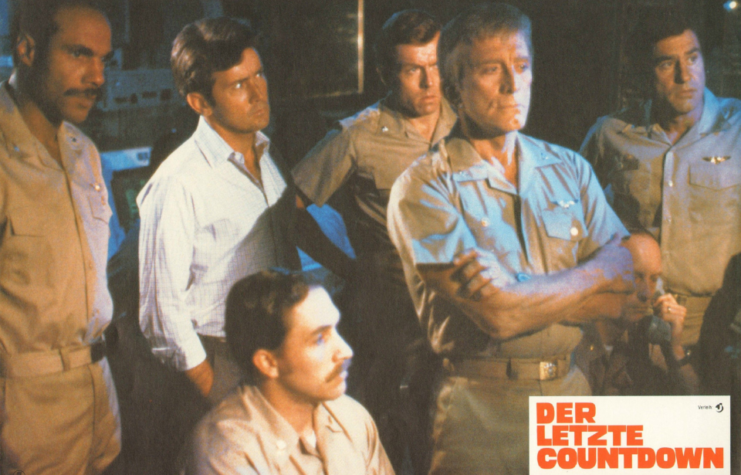
The Final Countdown, 1980. (Photo Credit: arrakis / MovieStillsDB)
The Final Countdown (1980) combines elements of time travel and military drama as it explores the concept of a modern aircraft carrier traveling back in time to the eve of the attack on Pearl Harbor during the Second World War. Kirk Douglas portrays Capt. Matthew Yelland, the commanding officer of the USS Nimitz (CVN-68), a contemporary aircraft carrier.
Nimitz and her crew find themselves transported through a vortex to December 6, 1941, just one day before the Japanese attack on Pearl Harbor. As the crew grapples with the reality of their situation, they face a moral dilemma: should they intervene and change history, potentially altering the course of the war?
Yelland’s character becomes central to the ethical and strategic decisions the crew must make. As Nimitz‘s commander, he must weigh the potential consequences of altering history against the desire to prevent the high loss of American lives at Pearl Harbor.
Remembrance of Love (1982)
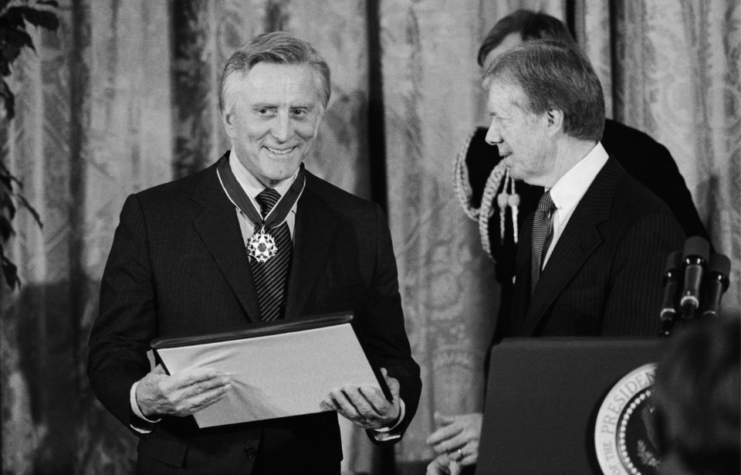
Kirk Douglas receiving the Presidential Medal of Freedom from US President Jimmy Carter, 1981. (Photo Credit: Bettmann / Getty Images)
Remembrance of Love (1982) is a film about a reunion of Holocaust survivors in Israel. At this event, Kirk Douglas, who portrays Joe Rabin, meets a woman he’d been in love with 35 years earlier when they were both in Poland during the Second World War.
Douglas’ son, Eric Douglas, who was 23 years old at the time, plays the role of a young Joe Rabin in flashback scenes. The film also features Robert Clary, who himself was a Holocaust survivor.
News
The “Red Zone” – Land Still Abandoned Due to the Dangers Left by the First World War
The “Red Zone” – Land Still Abandoned Due to the Dangers Left by the First World War In the aftermath of the First World War, large areas of northeast France were left in ruin. Years of constant siege warfare along…
Before Becoming a Big-Name Actor, Richard Todd was a Paratrooper Who Fought at Pegasus Bridge
Before Becoming a Big-Name Actor, Richard Todd was a Paratrooper Who Fought at Pegasus Bridge Photo Credit: 1. Sgt. Christie, No. 5 Army Film & Photographic Unit / Imperial War Museums / Wikimedia Commons / Public Domain 2. Silver Screen…
The Potsdam Giants: A Prussian Infantry Regiment Of Nothing But Very Tall Soldiers
The Potsdam Giants: A Prussian Infantry Regiment Of Nothing But Very Tall Soldiers Frederick William I inspecting his giant guards known as The Potsdam Giants, a Prussian infantry regiment No 6, composed of taller-than-average soldiers. Frederick William I of Prussia,…
Ellen DeGeneres cuts a very casual figure as she drives around in her Ferrari
Ellen DeGeneres cuts a very casual figure as she drives around Montecito in her Ferrari… while preparing to embark on her stand-up tour Ellen DeGeneres cut a very casual figure as she made her way around Montecito on Tuesday morning. The…
“I’m heavily tattooed and keep getting rejected for jobs – it’s not fair”
Heavily tattooed OnlyFans star, 23, with multiple piercings on her FACE slams TJ Maxx for rejecting her for a job – accusing retailer of unfairly judging her dramatic look A woman has accused TJ Maxx of rejecting her for a…
All 75 passengers killed in plane crash after pilot let his chirldren control the plane
Praying, turning the engine off by accident and letting KIDS play with the controls: The worst blunders made by pilots before a crash revealed Every time we board a plane, we put our lives in the hands of the pilot….
End of content
No more pages to load



